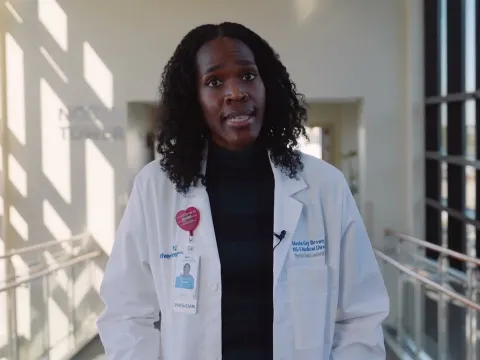
Dedicated Expertise for Neurological Needs
Caring for conditions that affect the brain, nerves and spine requires a team with extensive knowledge, a commitment to clinical excellence and, most importantly, uncommon compassion. And that’s what you can expect at AdventHealth Littleton.
With state-of-the-art equipment and a robust variety of treatment options, our neuroscience team provides advanced care for stroke, Parkinson’s disease, epilepsy, multiple sclerosis (MS), brain tumors and other neurological conditions. From diagnosis to recovery, our team of oncologists, epileptologists, EEG technologists, neuropsychologists, neurosurgeons, social workers and Nurse Navigators will be by your side.
We’re here to help you find the right neurologist or a location that’s convenient for you.
Neurology Treatments With a Whole-Person Focus
- Cancer Treatment
-
We see patients for a wide variety of brain tumors and cancer of the brain, head, base of the skull, pituitary gland and spine. Our medical oncologists remain at the forefront of cancer medicine and treatment, offering the most advanced brain cancer treatments available today, including precision medicines like immunotherapy and minimally invasive brain surgery.
Your team will review your condition and determine the best approach to your treatment, which may include standard chemotherapy, radiation therapy or surgery. We also offer the following brain cancer and brain tumor treatments:
- Awake craniotomy, a procedure to remove tumors from the brain while a patient is awake, which helps protect critical functions that sit deep inside the brain
- Immunotherapy and targeted therapy, a type of chemotherapy that focuses on destroying cancer cells only
- Laser interstitial thermal therapy (LITT), a minimally invasive procedure that uses laser energy to destroy brain tumors
- Stereotactic radiosurgery, a non-invasive procedure that uses intense beams of radiation to damage the cancer cells in brain tumors, meningiomas and acoustic neuromas; stereotactic radiosurgery can be performed using different technology platforms, including the newest technology called ZAP-X®
If you need hospitalization after surgery, you’ll be cared for in our special neurosurgery critical care unit staffed by nurses specially trained in neurological conditions and caring for people recovering from neurosurgery.
- Concussion Care
-
The experts in our Level II trauma center are highly experienced in assessing and diagnosing traumatic brain injury in patients of all ages. Led by a neuropsychologist, your care team will:
- Assess and diagnose in the emergency room or outpatient concussion clinics
- Create personalized treatment plans that may include physical therapy, occupational therapy and speech therapy
- Provide treatment and skill training to address memory changes, mood disturbances and learning difficulties
- Deep Brain Stimulation
-
Our AdventHealth Littleton hospital is a national leader in deep brain stimulation (DBS) for Parkinson’s disease, essential tremor, dystonia, epilepsy and obsessive-compulsive disorder (OCD).
Our Littleton neurosurgeons helped pioneer a procedure that allows patients to remain asleep (sedated) while the DBS leads are implanted in the area of the brain that initiates and controls tremors and other Parkinson’s symptoms. Our neurosurgery unit now performs more sedated DBS procedures than most centers worldwide.
We provide DBS for patients throughout the metro Denver area, wider Colorado and the entire Rocky Mountain region. Our neurosurgeons are renowned for being among the first in the country to advance new technology in DBS. Those advancements include:
- Robotic-guided DBS: Robotic-assisted surgery improves lead placement accuracy, the most important aspect of DBS. The more accurate the lead placement, the better control over symptoms of movement disorders, such as Parkinson’s disease.
- Directional DBS: Targeted therapy offers multiple contact points on the DBS lead, providing more options to direct stimulation to where it may be more effective.
- DBS Generator Programming: Our neurosurgeons have pioneered a two-step DBS procedure that means patients only need to visit the hospital twice instead of the typical three times. In addition, AdventHealth Littleton is one of the first sites in the country to offer remote DBS generator programming. This capability allows our neurosurgeons to adjust the programming via a secure WiFi connection between the physician and patient programmer to better manage symptoms without requiring travel to Denver.
- Epilepsy Treatment
-
Epilepsy is the fourth most common neurological condition, affecting more than 65 million people worldwide. While epilepsy is commonly associated with children, it can occur at any point in life. And after age 55, the rate of new cases of epilepsy starts to increase as people experience strokes, brain tumors, brain injuries or Alzheimer’s disease — all of which can cause epilepsy.
Our comprehensive Level 3 adult epilepsy program, which features an epilepsy monitoring unit and minimally invasive epilepsy surgery, is recognized by the National Association of Epilepsy Centers.
Our patients have access to:
Epilepsy Monitoring Unit (EMU)
Designed for patients 17 and older who need prolonged inpatient video electroencephalogram (EEG) monitoring, our EMU provides a safe space for our medical team to safely activate seizure activity by removing anti-epileptic drugs in a controlled environment. Plus, the EMU is physically located within the ICU, so patients are closely monitored by nursing teams and have immediate access to acute care when seizures happen.
Medication Management
Most people with epilepsy can become seizure-free by taking anti-seizure medication. But finding the right medication, or combination of medications, is complex. Our epileptologists and neurologists specialize in treating patients with epilepsy and can help you through this process. Once we have a definitive diagnosis of epilepsy, your epileptologist will consider the type and frequency of seizures, your age, your overall health, any other medications you might be taking and other factors to determine which medications to try. If medication doesn’t control your seizures satisfactorily or causes unwanted side effects, your doctor may suggest surgery.
Epilepsy Surgery
Our expert neurosurgeons offer all types of epilepsy surgery, including LITT, neurostimulation, vagus nerve stimulation, deep brain stimulation and traditional resection. We offer this range of surgeries to ensure that each patient has the procedure that’s most appropriate for their type of epilepsy, health history and lifestyle goals.
Contact us to learn more about our epilepsy treatment options.
- Neurological Rehabilitation
-
We take a multidisciplinary approach to help you achieve your highest level of function and independence. That’s why we connect you with our physical, occupational and speech therapists, who will collaborate to monitor and support you during your recovery.
- Stroke Care
-
Exceptional and swift stroke care has earned our Colorado AdventHealth hospitals Primary Stroke Center certification from the American Stroke Association.
At AdventHealth Littleton, we’ve been recognized as a Comprehensive Stroke Center, and provide the highest level of stroke care available. Our hospital also includes a specialized neurological critical care unit and neurorehabilitation to help patients recover as much function as possible.
Our Comprehensive Stroke Center provides 24-hour stroke care, along with:
Rapid Response
Emergency room nurses, specially trained in rapid response stroke protocols, work closely with emergency medical services teams to ensure the fastest possible treatment that starts while you or your loved one are being transported to the hospital.
Specialized Intensive Care
We feature a separate neurosciences intensive care unit staffed by registered nurses trained in assessing and caring for patients who have had a stroke.
Acute Stroke Rehabilitation
Stroke rehabilitation is one of the most vital phases of recovery for many stroke survivors. Our neuroscience center features an acute stroke rehabilitation program, providing customized treatment plans combining physical therapy, occupational therapy and speech therapy to give patients the strengths and skills they need to return to their highest level of function.
Support System
Case managers are available to assist families with decision-making, rehabilitation placement options, insurance questions and transportation. Chaplains are also available to help provide spiritual and emotional support for families and patients.
- Surgical Care
-
Our dedicated neurosurgical operating rooms feature state-of-the-art technology, including:
- Asleep deep brain stimulation (DBS), which allows surgeons to use a portable high-powered CT scanner to visualize the problem area of the brain while a patient sleeps
- Stryker navigational cranial software, an image-guided neurosurgery technology that allows neurosurgeons to better define anatomical landmarks and pathological structures for a safer and more complete tumor removal
- Pentero microscope, which is a revolutionary microscope that’s used for neurosurgery and spine surgery and features optimum optics and integrated digital visualization
Monitoring Epilepsy With Great Care
Our Epilepsy Monitoring Unit (EMU) is an advanced, specialized facility focused on diagnosing and treating epilepsy. Using leading-edge technology, including electroencephalogram (EEG), to monitor brain activity and detect seizures, we provide comprehensive care to those affected by epilepsy.
Proven Care for Neurological Conditions
- Acoustic Neuromas
- Amyotrophic Lateral Sclerosis (ALS), or Lou Gehrig’s Disease
- Aneurysms
- Arterial Venous Malformations (AVMs)
- Brain and Skull Base Tumors
- Brain Tumors
- Carotid Stenosis
- Chiari Malformations
- Colloid Cysts
- Concussions
- Dystonia
- Epidural Hematoma
- Epilepsy
- Essential Tremor
- Hydrocephalus
- Intracranial Stenosis
- Migraines
- Multiple Sclerosis (MS)
- Normal Pressure Hydrocephalus
- Obsessive Compulsive Disorder (OCD)
- Parkinson’s Disease
- Pituitary Tumors
- Spine Conditions
- Spine Tumor
- Stroke
- Subdural Hematoma
- Traumatic Brain Injury
- Trigeminal Neuralgia and Facial Pain
- Vertebral Stenosis

Care for the Brain and Nervous System You Can Count On
Our neurology specialists are highly skilled in providing compassionate, comprehensive care for the brain and nervous system. Our neuroscience experts use leading-edge technology and a variety of treatment options to provide care you can count on.

